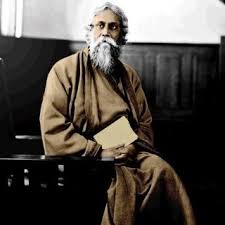Rabindranath Tagore, Bengali Rabīndranāth Ṭhākur, (7 May 1861 – 7 August 1941) was a poet, short story writer, novelist, playwright, painter, educator, philosopher and humanitarian. He also composed roughly 2,230 songs. His writings address a variety of topics. He was highly influential in introducing Indian culture to the west and vice versa. In 1913 he became the first non-European as well as the first lyricist to receive the Nobel Prize for literature. In 1915, he was knighted by the George V, King of the United Kingdom and Emperor of India, but he later renounced the knighthood as a protest against the 1919 Jaliānwala Bāgh massacre. His songs, Jana Gana Mana and Amar Śonar Bangla, later became the national anthems for India and Bangladesh respectively.
To the west, Tagore is mainly known as the voice of India’s spiritual heritage; and that certainly does not do justice to his all pervasive influence upon generations of authors as well as common people. In India, his authority is exploited to justify all sorts of political and ideological stance – expanding from extreme right to the liberal and the left. What is really missing is a healthy critical discourse on this great author. Tagore’s genius is comparable with that of Shakespeare’s.


